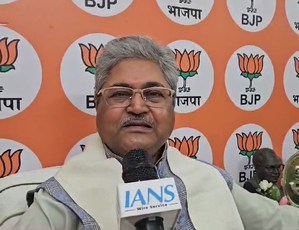New Delhi: BJP National General Secretary Dushyant Gautam on Wednesday accused the Delhi government of blaming neighbouring states for the national capital’s rising pollution and bashed its handling of the air quality crisis.
He claimed that the Aam Aadmi Party (AAP) government in Delhi is endangering lives as the air in the city has turned into a death trap.
In a conversation with IANS, Gautam said, “This change will not come until the AAP government stops blaming neighbouring states. Today, they target Haryana, but a few days ago, they blamed Punjab. Now, having formed a government there, they no longer name it, though pollution levels are also rising in Punjab.”
Taking aim at AAP leader Arvind Kejriwal, Gautam added, “His administration has misled Delhi residents for years, turning the city into a death trap. If pollution decreases, they’ll boast in press conferences, but if it rises, they impose odd-even measures or blame the central government.”
“They blame the neighbouring states, but themselves have no record of what work they have carried out to curb the pollution levels. AAP’s measures offer little actual relief to Delhi residents. The public is awaiting the Assembly elections to oust this fraud government,” he said.
Wednesday morning saw a thick smog layer envelop Delhi and the National Capital Region (NCR), reducing visibility as air quality plunged to ‘very poor’ levels.
According to Central Pollution Control Board (CPCB) data, Delhi’s average AQI was recorded at 349 by 6 a.m. NCR cities were also impacted, with Faridabad at 196, Gurugram at 266, Ghaziabad at 276, Greater Noida at 289, and Noida at 269.
Aya Nagar recorded the highest AQI in Delhi, hitting a severe 406, while most other areas ranged between 300 and 400.
Earlier, IQAir, a Swiss air quality monitoring organisation, reported Delhi’s AQI as high as 1,133 in some areas, labelling the air ‘hazardous’, with PM2.5 as the main pollutant.
The smog, combined with moderate fog and mist, caused low visibility in the morning hours. Experts predict the haze will persist into the evening, posing significant health risks, especially for individuals with respiratory issues.
Delhi’s AQI has remained in the ‘very poor’ category since October 30, with the seasonal increase largely attributed to stubble burning in Punjab and Haryana as farmers clear fields post-harvest.
Meanwhile, parts of Punjab and Haryana reported ‘poor’ air quality levels, with Chandigarh, the joint capital, recording an AQI of 349 on Tuesday night. Punjab reported 83 new farm fires, bringing the season’s total to 7,112.
The CPCB defines AQI levels as — 0-50 ‘good’, 51-100 ‘satisfactory’, 101-200 ‘moderate’, 201-300 ‘poor’, 301-400 ‘very poor,’ 401-450 ‘severe’, and above 450 ‘severe plus’.
–IANS


Comments are closed.